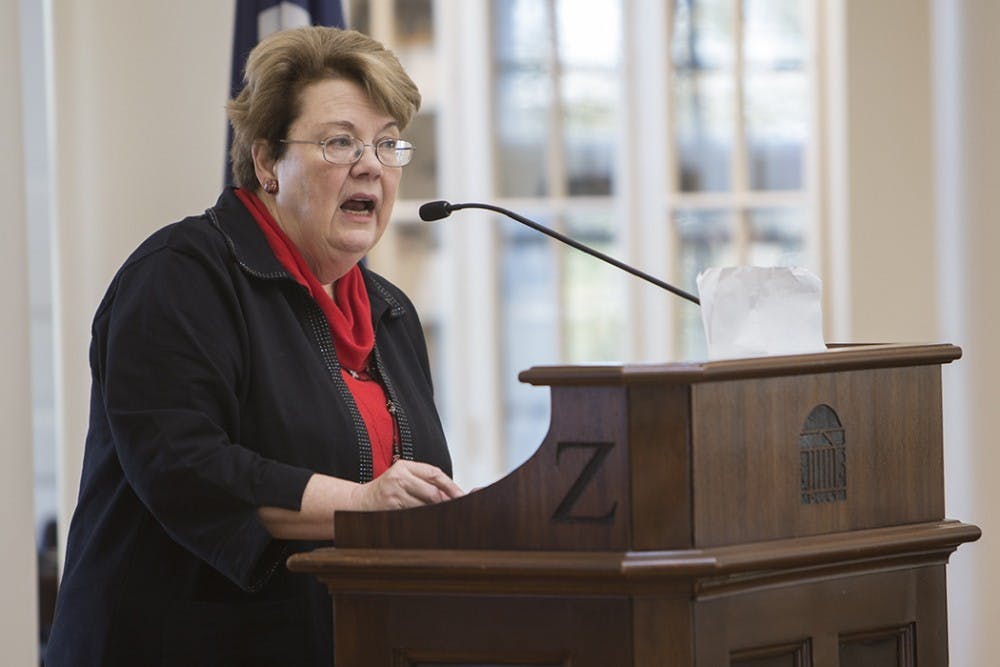The full Board of Visitors convened at 8 a.m. Thursday morning to discuss, among other things, the University’s response to two protests that occurred on Grounds in the past month.
Frank Conner, the rector of the Board, opened the meeting with a statement on the first protest, the Aug. 11 white supremacist march on Grounds to the statue of Thomas Jefferson at the Rotunda.
“I’m all for passionate protest, but I think we’ve had enough of that,” Conner said. “We’ve had a lot of commentary, a lot of passion, a lot of discussion about what’s been going on in Charlottesville and on Grounds since Aug. 11. What I’m going to do today is to frame where I think we are and where we need to go as a community.”
Conner also emphasized safety as the Board’s highest priority when considering how to go forward.
“Everything we do is to designed to improve the student experience,” Conner said in an interview after the meeting. “And not all students understand that because they don’t see all of the pieces of the puzzle like we do. There is some very exciting stuff going to be announced over the next couple of days, so stay tuned for that.”
University President Teresa Sullivan echoed the rector’s comments in her subsequent address to the board, naming the safety of students as both the University's and her own first priority.
“As we continue working toward greater diversity and inclusion we must also continue to uphold the principles of the first amendment,” Sullivan said. “We must continue to foster free speech, open discourse and the clash of ideas. Any restriction on free expression is incompatible with the values of higher education and our university’s commitment to the freedom of the human mind.”
On Tuesday night, there was another, student-led protest during which participants surrounded and shrouded the statue of Jefferson. President Sullivan acknowledged the rights of the students and community members to express their opinions about Jefferson, however she stated her disagreement with their decision to cover the statue in a black shroud.
The statue was designed by a Jewish sculptor named Moses Ezekiel, who was born in 1844 in Richmond and faced anti-semitism throughout much of his life. He built into the sculpture a tribute to Jefferson’s contribution to freedom of religion — one of the figures on the plinth holds a tablet carved with names for a divine creator given by people of various different cultures: Jehovah, Allah, Brahma, Ra, Atma, Zeus and God.
“Although I recognize the rights of those protesters to express their opinions, I strongly disagree with covering the Jefferson statue,” Sullivan said. “This history reminds us that despite our founder’s faults, he made monumental contributions to religious freedom and other kinds of freedom. We risk losing sight of those contributions if we shroud him in darkness because of his shortcomings.”
Sullivan also announced the University would meet the third demand listed in the Black Student Alliance’s demands for the “March to Reclaim our Grounds.” The demand asks the University to acknowledge the $1,000 gift that the Ku Klux Klan gave to the University’s centennial fund in 1921 and reinvest the money.
The University will donate $12,500 — the $1,000 amount adjust for inflation — to the Charlottesville Patient Support Fund.
“We’re going to acknowledge that pledge, and we’re going to do it in a way that will be as disagreeable as possible to any remnants of the Ku Klux Klan who are watching,” Sullivan said. “In other words, we’re allocating that centuries old pledge from white supremacists to heal the wounds inflicted by the dying vestiges of white supremacy that struck Charlottesville last month.”
Sullivan closed the full board meeting with a reminder that the recent events in Charlottesville have thrust the University into the national spotlight, and people will be watching to see the University community’s response to them.







